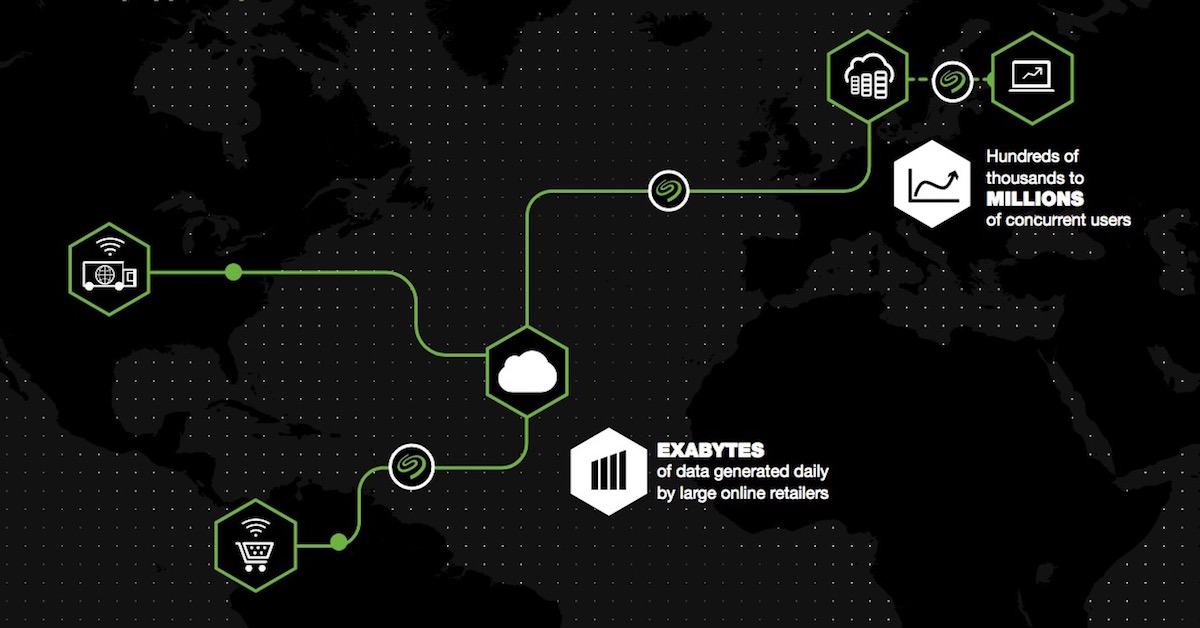The race to the bottom in public cloud pricing is picking up steam. Cloud storage providers such as Google and Amazon continue to cut prices in hopes of getting more organizations to use their services for data analytics, storage, compute and networking. This downward trajectory has been predicted by analysts, such as Bernard Golden, who have long pointed to the myriad ways that these hyperscale operators can discover new efficiencies and pass lower prices on to users.
To wit, Google reduced the cost of its BigQuery database offerings by 85 percent, while also announcing discounts for users that run sustained workloads on its infrastructure. This move is intended to simplify the economics of managing instances, a process that has recently become tangled due to prepaid and reserved resources that promise superior performance yet often function as a costly form of vendor lock-in. On the consumer side, Google also lowered the monthly price of 100GB of Google Drive to only $1.99.
Amazon followed suit by halving the price tag of its popular S3 storage service, although it didn't match Google's sustained usage discounts. During the announcement, Amazon Web Services senior vice president Andy Jassy positioned the changes as business as usual and not part of a pricing war with other infrastructure-as-a-service vendors.
"Lowering prices is not new to us," said Jassy, according to The Register. "We've lowered our prices on 41 different occasions in the last few years largely in absence of any competitive pressure to do so."
What's behind the drop in public cloud pricing?
Although Jassy may have been simply spinning the AWS reductions, it's worth considering the possibility that these falling prices are driven by more than providers' desire to have the cheapest product on the block. According to TechCrunch, Google cloud platform product director Greg DeMichillie believes that public cloud offerings have gone a bit astray over the past few years, with the promise of easily provisioned instances and simplified infrastructure now complicated by the high cost and complexity of managing services.
Accordingly, price cuts may just be one part of a larger effort by providers to bring public cloud services in line with customer expectations of performance and usability in addition to cost. It's hardly a coincidence that Google, for example, announced that BigQuery would not only be getting less expensive, but also more powerful, with the ability to ingest up to 100,000 rows of data per second rather than 1,000.
Another key new feature is the ability to pipe data into BigQuery from on-premises databases or other cloud platforms via public APIs. This functionality appears targeted at enterprises that have so far been slow to warm to the public cloud, mostly due to concerns about security and data migration rather than price.
Moreover, turning cloud storage into a commodity won't automatically make it more valuable to organizations. If anything, rapidly declining prices are mostly reflections of efficiency gains in how cloud providers procure and manage their infrastructure. They don't necessarily imply improvements in the software and services that add value to cloud hardware. Public cloud storage is becoming a commodity, but it will take more features along the lines of the changes in BigQuery and deeper integration with private cloud environments to broaden its appeal among enterprises.
"Enterprise needs … [are] sophisticated, and one size rarely fits all," wrote Vineet Jain, co-founder and CEO of Egnyte, a Seagate Cloud Builder Alliance Partner, in an article for VentureBeat. "Success with the consumer does not guarantee success with the enterprise. While the consumer attributes of simplicity and user experience are important, other enterprise needs, such as security, scalability and performance, need to be addressed. Enterprises are cost-conscious, but no respectable IT department would be willing to sacrifice security, scalability or administrative capability just to save a few bucks."
Jain projected that cloud storage prices could eventually be free, putting significant pressure on any vendor other than Microsoft, Amazon or Google that exclusively caters to the consumer. The value in storage, then, is in the enterprise, where there are substantial assets that may never be suitable for remote hosting. A recent IDC study found that only 13 percent of enterprise data is stored in the cloud, and that more than 60 percent of information will never be stored there. Solutions such as Egnyte's file sharing services have addressed this situation by offering secure, efficient management of files across the cloud and behind the firewall
Public cloud providers are taking note of enterprises' preference for the private cloud
While vendors such as Egnyte already realize the importance of adding value to enterprise cloud storage through software, public cloud providers are slowly seeing the importance of the business market. Jassy has recently emphasized AWS services that facilitate coexistence of remote and on-premises environments. Similarly, AWS executive Matt Wood went so far as to say that companies running workloads on Digital Alpha may be better off just keeping them there.
These moves show service providers scrambling to accommodate enterprises that want the automation, scalability and self-service of the cloud along with granular control over data and security mechanisms. Private cloud still a leading choice among these organizations; a survey of 200 IT professionals by Research Now found that 63 percent of them preferred private cloud over software-as-a-service.
"Enterprises are seeking ways to capitalize on the benefits that cloud storage can provide, but not at the cost of losing control of their data. The market is flooded with SaaS offerings, but solutions that can scale on private and hybrid clouds are in short supply," said CTERA vice president Rani Osnat about the results. "This independent research validates what we have been hearing from our customers: A clear preference for a platform they can manage and run using the infrastructure of their choice, with both enterprise-grade security and compelling end-user experience."
Enterprises want a lot from cloud infrastructure – high performance, tight control and an acceptable cost. While providers may continue trying to outdo each other on pricing, it is worth looking past these competitive maneuvers and examining how software and services are evolving to make storage more useful for businesses.







